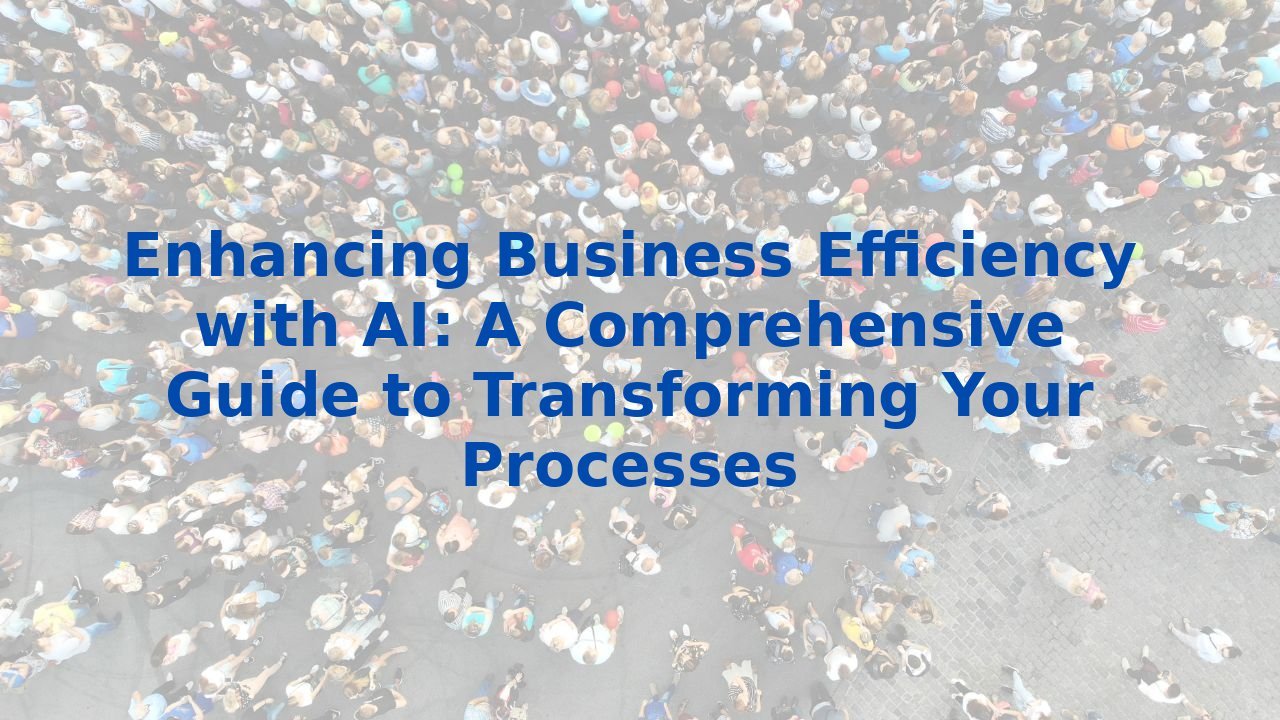Enhancing Business Efficiency with AI: A Comprehensive Guide to Transforming Your Processes
Enhancing Business Efficiency with AI: A Comprehensive Guide
In today's fast-paced business environment, organizations seek innovative strategies to improve efficiency and maintain competitiveness. One of the most transformative tools emerging in this arena is Artificial Intelligence (AI). By integrating AI into various operational processes, businesses can streamline routine activities, bolster decision-making, and optimize overall efficiency. This guide will delve into the ways AI can revolutionize business operations while underscoring its myriad benefits.
Understanding AI Process Optimization
AI process optimization embodies the application of AI and machine learning to refine business process management. This involves analyzing vast data sets, automating repetitive tasks, and enhancing organizational strategies designed to meet specific goals. The central aim is to minimize errors, increase productivity, and elevate operational efficiency across the board.
Key Benefits of AI in Business Processes
When implemented effectively, AI can unlock potential across numerous business functions. Here’s how:
1. Automating Routine Tasks
AI excels at automating mundane, repetitive tasks such as data collection, invoice processing, and social media management. This shift not only alleviates the burden on human employees but also enables them to redirect their focus towards more strategic initiatives.
2. Improving Decision Making
With AI's predictive capabilities, organizations can garner insights based on historical data patterns. Business analysts wield AI tools to simulate the impacts of varying pricing strategies, which empowers informed decision-making rooted in data rather than intuition alone.
3. Enhancing Process Efficiency
AI's analytical prowess allows it to sift through historical process data, identifying trends and interdependencies that may otherwise go unnoticed. By leveraging this information, companies can simulate different process scenarios, optimizing for key performance indicators (KPIs) like cost efficiency and lead times.
4. Real-Time Monitoring and Predictive Analytics
AI-driven process mining revolutionizes real-time monitoring. By dissecting log data from various source systems, AI can reveal deviations from established processes, identify anomalies, and suggest pathways for optimization. This real-time feedback loop allows businesses to swiftly adapt to changing conditions.
5. Process Automation
With Robotic Process Automation (RPA) that integrates AI, businesses can automate rule-based tasks once reliant on human intervention. This technological shift enhances overall efficiency, freeing team members to engage in more value-added activities that foster growth.
The Role of AI in Continuous Improvement
AI serves as a catalyst for continuous improvement by delivering ongoing feedback, actionable insights, and data-driven recommendations. Organizations can attain lasting advancements through iterative process optimization based on AI's feedback mechanisms. This ensures business process management (BPM) strategies remain nimble and aligned with both company objectives and industry evolution.
Training Employees for AI: A Crucial Step
While AI stands as a powerful asset, its capabilities are fully realized only when employees are equipped to leverage it. Training initiatives can yield remarkable outcomes by focusing on:
1. Understanding AI Technologies
It’s vital for employees to grasp foundational concepts surrounding AI, including machine learning and natural language processing. This foundational knowledge fosters seamless integration into daily operations.
2. Data Analysis and Interpretation
Comprehending data insights generated by AI is crucial. Training should encompass skills that empower employees to interpret these insights effectively, ensuring informed decision-making.
3. Collaborative Work with AI Systems
Employees must develop an ability to communicate and collaborate with AI systems. Understanding how to input data, evaluate results, and make judgments based on AI recommendations is essential for maximizing AI benefits.
4. Adaptability and Continuous Learning
The evolution of technology is relentless, and employees must exhibit flexibility and a commitment to continuous learning to stay abreast of the latest AI advancements.
Organizations that invest in employee training stand to gain the most from AI's transformative power, ultimately fostering improved efficiency and bolstering competitiveness.
Conclusion
AI has fundamentally changed the organizational landscape by enhancing process efficiency, facilitating data-driven decision-making, and automating routine tasks. By embracing the advantages of AI and prioritizing employee education, companies can harness these technologies for sustained improvements, poised to thrive in a fast-evolving marketplace. Whether through automating mundane tasks or offering predictive insights, the transformative potential of AI stands ready to drive success across industries.
For organizations looking to equip their workforce with AI skills, exploring comprehensive training options can pave the way for an empowered team ready to navigate the future of business.



